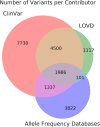BRCA Challenge: BRCA Exchange as a global resource for variants in BRCA1 and BRCA2
- PMID: 30586411
- PMCID: PMC6324924
- DOI: 10.1371/journal.pgen.1007752
BRCA Challenge: BRCA Exchange as a global resource for variants in BRCA1 and BRCA2
Abstract
The BRCA Challenge is a long-term data-sharing project initiated within the Global Alliance for Genomics and Health (GA4GH) to aggregate BRCA1 and BRCA2 data to support highly collaborative research activities. Its goal is to generate an informed and current understanding of the impact of genetic variation on cancer risk across the iconic cancer predisposition genes, BRCA1 and BRCA2. Initially, reported variants in BRCA1 and BRCA2 available from public databases were integrated into a single, newly created site, www.brcaexchange.org. The purpose of the BRCA Exchange is to provide the community with a reliable and easily accessible record of variants interpreted for a high-penetrance phenotype. More than 20,000 variants have been aggregated, three times the number found in the next-largest public database at the project's outset, of which approximately 7,250 have expert classifications. The data set is based on shared information from existing clinical databases-Breast Cancer Information Core (BIC), ClinVar, and the Leiden Open Variation Database (LOVD)-as well as population databases, all linked to a single point of access. The BRCA Challenge has brought together the existing international Evidence-based Network for the Interpretation of Germline Mutant Alleles (ENIGMA) consortium expert panel, along with expert clinicians, diagnosticians, researchers, and database providers, all with a common goal of advancing our understanding of BRCA1 and BRCA2 variation. Ongoing work includes direct contact with national centers with access to BRCA1 and BRCA2 diagnostic data to encourage data sharing, development of methods suitable for extraction of genetic variation at the level of individual laboratory reports, and engagement with participant communities to enable a more comprehensive understanding of the clinical significance of genetic variation in BRCA1 and BRCA2.
Conflict of interest statement
I have read the journal's policy and have the following conflicts: SEP is a member of the Scientific Advisory Board of Baylor Genetics, and is on the editorial board of PLOS Genetics. MR receives advisory fees, travel fees, and honoraria from AstraZeneca. The other authors have no competing interests to declare.
Figures



Comment in
-
BRCA Exchange Launches.Cancer Discov. 2019 Mar;9(3):311-312. doi: 10.1158/2159-8290.CD-NB2019-008. Epub 2019 Jan 24. Cancer Discov. 2019. PMID: 30679172
References
-
- Global Alliance for Genomic & Health. GA4GH Connect: A 5-Year Strategic Plan. [cited Mar 20 2018]. In: GA4GH Connect. Available from: https://www.ga4gh.org/docs/GA4GH-Connect-A-5-year-Strategic-Plan.pdf.
-
- Spurdle AB, Healey S, Devereau A, Hogervorst FB, Monteiro AN, Nathanson KL, et al. (2012) ENIGMA—evidence-based network for the interpretation of germline mutant alleles: an international initiative to evaluate risk and clinical significance associated with sequence variation in BRCA1 and BRCA2 genes. Hum Mutat 33: 2–7. 10.1002/humu.21628 - DOI - PMC - PubMed
Publication types
MeSH terms
Grants and funding
LinkOut - more resources
Full Text Sources
Other Literature Sources
Miscellaneous

